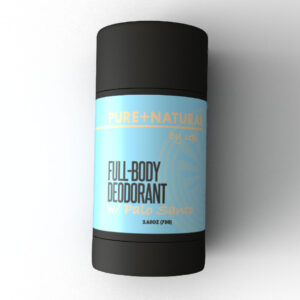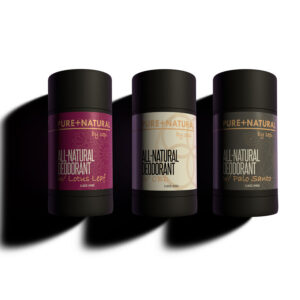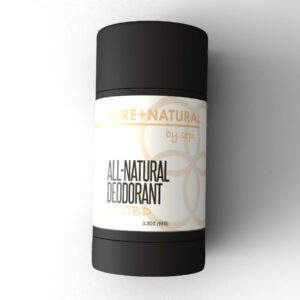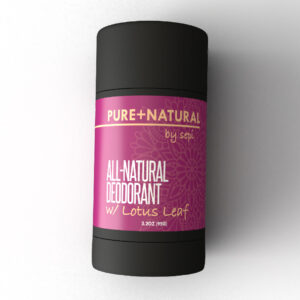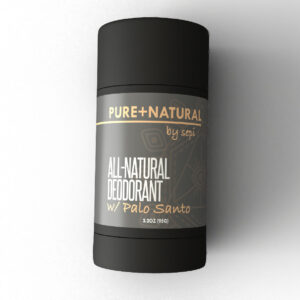There isn't a single ingredient in natural deodorants that universally causes irritation, as everyone's skin is different and may react to different ingredients in various ways. However, some common ingredients in natural deodorants that may cause irritation or allergic reactions in some individuals include baking soda, essential oils, and fragrance.
What can cause irritation?
Baking soda, also known as sodium bicarbonate, can irritate some people’s skin because it is alkaline in nature, meaning it has a higher pH than the natural pH of our skin, which is slightly acidic. When baking soda is applied to the skin, it can disrupt the skin’s natural pH balance, which can lead to irritation, redness, and dryness.
Additionally, some people may have a specific sensitivity or allergy to baking soda, which can cause a more severe skin reaction. This sensitivity can develop over time, especially with repeated or prolonged use of baking soda on the skin.
If you’re experiencing skin irritation or discomfort from using a natural deodorant that contains baking soda, you may want to try switching to a different product that is baking soda-free, or look for a formulation that uses a lower concentration of baking soda. Alternatively, you may want to consider using a deodorant that does not contain baking soda at all and instead uses other natural ingredients like arrowroot powder, cornstarch, or kaolin clay as an absorbent agent.
Essential oils, such as lavender, tea tree, and peppermint, are also commonly used in natural deodorants for their pleasant scent and antibacterial properties, but they may cause skin irritation or allergic reactions in some people.
Why do essential oils cause irritation?
Essential oils are highly concentrated plant extracts that contain various compounds that can cause skin sensitization or irritation, especially when used in large amounts or when applied directly to the skin. For example, some essential oils like peppermint or cinnamon can be particularly irritating to the skin, while others like lavender or tea tree may cause allergic reactions in some individuals.
It’s worth noting that the quality and purity of essential oils can also affect their potential for skin irritation. Poor quality or adulterated essential oils may contain additional compounds or contaminants that can increase the risk of skin reactions.
Fragrances, whether natural or synthetic, can also be a source of irritation for some individuals, and may cause itching, redness, or a rash.
Why do fragrances cause irritation?
Fragrances can cause irritation in some people due to their chemical composition. Fragrances are typically made up of a complex mixture of chemicals, which can include synthetic compounds and natural substances like essential oils.
Some people may have an allergic or sensitivity reaction to certain fragrance ingredients, which can cause irritation or even an allergic reaction. This is because the body perceives these compounds as foreign invaders and launches an immune response to fight them off. This immune response can cause inflammation, redness, itching, and other symptoms associated with skin irritation.
Additionally, some fragrances can be harsh and irritating to the skin or respiratory system, especially if they are used in high concentrations. Fragrances can also be a source of environmental pollution and contribute to indoor air pollution, which can exacerbate respiratory issues for those with asthma or other respiratory conditions.
It’s worth noting that the fragrance industry is largely unregulated, and companies are not required to disclose all of the ingredients in their fragrances. This lack of transparency can make it difficult for people to know exactly what they are exposing themselves to when using fragranced products.
It’s important to note that while natural deodorants may be less likely to contain potentially harmful ingredients, they are not necessarily gentler or less irritating than conventional deodorants, and may still cause skin reactions in some people.
What other ingredients can cause irritation?
In addition to fragrances, there are several other deodorant ingredients that can cause irritation in some people. Some of these ingredients include:
- Aluminum: Aluminum-based compounds are commonly used in antiperspirant deodorants to help reduce sweat. However, some people may develop skin irritation or contact dermatitis from these compounds.
- Parabens: Parabens are a group of preservatives commonly used in deodorants and other personal care products. They have been associated with skin irritation, allergic reactions, and even hormone disruption.
- Propylene glycol: Propylene glycol is a synthetic compound used as a humectant and emulsifier in deodorants. It can cause skin irritation and allergic reactions in some people.
- Triclosan: Triclosan is an antimicrobial agent used in some deodorants and other personal care products. It has been associated with skin irritation and may contribute to the development of antibiotic-resistant bacteria.
- Sulfates: Sulfates are foaming agents commonly used in shampoo, body wash, and other cleansing products. They can be harsh and drying, and may cause irritation or allergic reactions in some people.
- Retinoids: Retinoids are a group of vitamin A derivatives commonly used in anti-aging and acne treatments. They can be effective, but they can also cause redness, peeling, and other skin irritation.
- Alpha-hydroxy acids (AHAs): AHAs are a group of acids commonly used in skincare products to exfoliate the skin and improve texture. However, they can also cause skin irritation, especially if used in high concentrations or on sensitive skin.
- Formaldehyde-releasing preservatives: These are preservatives commonly used in personal care products to prevent bacterial growth. However, they can also release formaldehyde, a known carcinogen, and may cause skin irritation or allergic reactions in some people.
It’s important to note that everyone’s skin is different, and what causes irritation in one person may not affect another person at all. If you experience any skin irritation or discomfort from using a deodorant, you should discontinue use and speak to your healthcare provider.
-
Pure + Natural – 100% All-Natural Deodorant – Full Body
Add to cart -
Deodorant Bundle – GET ALL 3
Add to cart -
Pure + Natural – 100% All-Natural Deodorant – Max Strength with CBD
Add to cart -
Pure + Natural – 100% All-Natural Deodorant Lotus Leaf
Add to cart -
Pure + Natural – 100% All-Natural Deodorant Palo Santo
Add to cart


